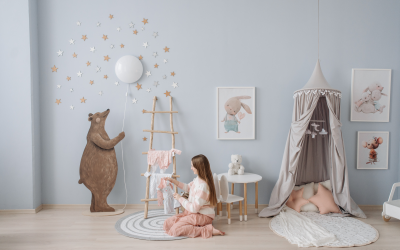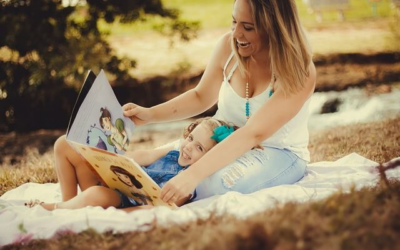The sight of your newborn smiling is no doubt captivating to watch. However, it is a myth that your kid is smiling because it is happy. Newborns cannot feel emotions before the age of 2-3 months, so their smiles are completely spontaneous. Sometimes babies smile during their sleep which is due to rapid active movements and not because of playing with angles in their dreams!
Let’s learn how to make babies smile, some engaging facts about why newborns smile, and why do babies smile in their sleep.
Why do Babies Smile?
Your baby’s smile is a symbol of their health and happiness. There is no need to worry if your newborn is smiling while sleeping. It is completely normal due to several reasons. Your baby can either be passing gas, seeing a dream, or having a reflex.
If your newborn is 2-3 weeks old and smiling at you, it is mostly called a “Reflex Smile”. However, if the kid has grown up to 2-3 months, it can be smiling to interact with you. Doctors refer to it as a “social smile”. Along with helping them engage, their smiles help them grow psychologically and physically.
Why does a Newborn Smile During Sleep?
Infants can smile during their sleep for several reasons. It can be a beautiful dream, an emotion, or it can simply be an endogenous process. For many people out there, it is still a matter of worry about why babies smile in their sleep. There are several reasons for it so let’s dive into the details!
- Emotional Smile:
The babies in their early weeks are developing emotions, their brain is in the maturation stages. Whatever they experience throughout the day, their mind processes it during the night. Whether it is new interaction with someone, seeing more smiley faces, or hearing new sounds. All the information is getting interpreted by the developing brain. So, keep your baby surrounded by a happy environment, and you will probably see them smile during sleep!
- Reflexive Smile:
Most of the time, your baby is smiling due to an endogenous reflex when he is only a week or two old. Babies undergo rapid active movements (REM) during their sleep, which includes twitching and movement of muscles below the eyelids. These movements might cause the baby to smile during sleep. The reflex can be triggered due to some behavioral changes the newborn may be undergoing.
- Relieving Smile:
What kind of smile can be a relieving one? In case of an unhealthy stomach, the baby might be crying more than usual. It leads the baby to get uncomfortable, and its gut uneasy. Sometimes the kid gets irritable and stubborn. These digestive problems are due to the gas in the stomach, or due to air swallowing or any virus. When the gas is passed, that baby feels comfortable again and smiles! The smile after passing gas is referred to as relieving.
- Dream Smile:
Your baby might be seeing a dream that caused it to smile. The happy dream can be related to your baby’s favorite pet, favorite toy, or about you! It can be anything that makes your baby feel good during the day. The content feelings of your kid keep it smiling during the night too.
How does REM Affect Your Baby’s Smile?
Rapid active movements occur in our eyes after 80-90 minutes of sleep. In these movements, the eyes move to and for behind the eyelid increasing your heart rate. This REM phase of sleep will cause the baby to see the dreams leading to your kid’s smile. So, dreaming occurs when our brain processes the memories and emotions we felt throughout the day or in the past.
Reviewing Reasons on Why Babies Smile During Sleep:
A smile assures the wellness of your baby. It makes the environment joyful no matter what the reason is. Let’s take a quick review about what can be the reasons that you see the fascinating sight of your baby smiling during sleep. We talked about the reflex smile due to REM or any endogenous function. Secondly, we studied how emotions can lead to a dream and how a beautiful dream can make your baby smile. Thirdly, a relieving smile makes your baby feel comfortable and easy by releasing excessive gas. Besides these reasons, your baby can smile when you feed its taste buds. Simply put, the better the taste, the brighter the smile!
Moreover, recognizable scents, people, or environments can make your baby feel at home and lead to a smile. Most of the time, when your newborn is smiling while unconscious, it is due to a dream.
Could a Baby’s Smile be a Warning Sign?
A baby smiling, either awake or asleep, is always a joyful sight. So, how can a joyful smile, a fascinating one at that, be an alarming sign? Well, it can be a case of Gelastic seizure. It is an epilepsy condition that occurs along with laughter fits. The heartbeat and breathing rate fastens while the face appears uncontrollably smiling. Though these cases are quite rare, if you notice such seizures, you must contact your doctor as soon as possible!
How to Make Your Baby Smile?
Seeing your baby look up at you and start smiling is truly one of the most beautiful things in the world. But like all beautiful things, this baby’s smile is somewhat rare, and you may not get to see it if the baby’s mood is upset. Also, the first smile you see of your baby is not usually true. It is a reflex smile that occurs because of the actions of various facial muscles. The first true smile of your baby is even considered a developmental landmark. A true smile like this depends on the state of consciousness of the baby. There are a total of six different states through which a baby goes through several times a day. The overall mood of the baby, whether it is joyful or sad, depends greatly on these six states. However, there are some things that you can do to make your baby smile. The various methods you can use to make your baby smile are:
- Making Funny Faces
You can make your baby smile by making different unique gestures with your face. The sense of sight will make an impression on your baby’s mind, and if they feel like it, it will surely smile at you. You can try the traditional peek-a-boo, winking, funnily moving your eyes and ears, etc. You can even try something new that you think your newborn gives a better response to.
- Making Funny Noises
Sound after sight is the most basic of the senses in humans. Babies occasionally give positive responses to various sounds that seem funny. Different toys which are designed for babies make a funny noise when squished. All this shows that babies do respond to various sounds.
- Tickling
Although tickling often results in a burst of jerking laughter in young children and even adults, gentle and feeble tickling may cause your newborn to smile. A feather is a perfect thing for this. Slight tickling with the help of a feather may induce smiling in the baby. However, be careful. The tiny wings in those feathers can sometimes go into the baby’s nose or mouth and can cause serious complications.
- Other things which make your baby smile.
Various other ways to make your baby smile are popping up on your lips, dancing to silly music, putting on some crazy puppet show, etc. In short, anything which is out of the ordinary for your baby may cause them to smile.
Nine Small Acts to Make Your Baby Smile:
| Number | Method |
| 1 | Funny Sounds |
| 2 | Weird Faces |
| 3 | Smiling at the Baby |
| 4 | Giving the baby a joyful environment |
| 5 | Your baby seeing others laughing |
| 6 | Tickling your Baby |
| 7 | Playing peek-a-boo with your baby |
| 8 | Getting weird with the baby |
| 9 | The presence of pets |
A Scientific Study:
According to an article published on “Child Development” in 1986 by the Society of Research in Child Development. Newborns of around four months start discriminating among the various facial expressions, especially happiness over other expressions. It means that one of the earliest emotions the baby can experience is happiness and smiling, which are subsequently the ultimate expression they give. The research indicates that the baby starts to differentiate between these facial expressions at around three months. It is interesting to note that at the age of 3 months, the baby differentiates more clearly the expressions of their mother than a stranger’s. https://www.jstor.org/stable/1130379
Conclusion:
To sum it up, a smiling baby is the most beautiful thing a mother can experience. Babies start smiling at different ages, depending on the various external environmental factors. The amount of effort the parents put in making their baby happy also plays a significant role in the overall smiling nature of the baby. Although it is a common notion that babies laugh or smile when awake, babies are also observed to be smiling during their sleep.
Also interesting to read:
- Newborn wouldn’t sleep unless held
- Newborn dry lips: Sign, Causes and Treatments
- When To Switch Nipple Sizes On Baby’s Bottle – A Full Guide!
- HOW TO AVOID BURNOUT AS A STAY AT HOME MOM
- Reasons CPS can take your Newborn
- Newborn sticking tongue out
- Newborn Snoring
- How To Clean Baby Ears
- Newborn Swim Diapers
- Engaging Facts About Why Do Babies Smile in Their Sleep





